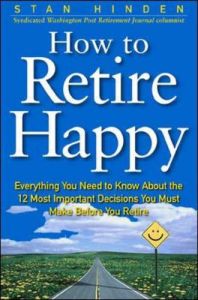Join getAbstract to access the summary!

Join getAbstract to access the summary!
Stan Hinden
How to Retire Happy
Everything You Need to Know About the 12 Most Important Decisions You Must Make Before You Retire
McGraw-Hill, 2001
What's inside?
Every retirement plan should have one main objective: to keep yourself mentally and physically active and in close contact with other people. That costs money.
Recommendation
Stan Hinden provides answers (or shows you where to get the answers) to the major questions you face upon retirement in the United States: Are you ready to retire? Can you afford to? What will Social Security and pensions provide? How do you deal with company savings plans and IRAs? How should you invest? What do you do about health insurance or preparing for serious illness? How do you decide where to live? Hinden warms his factual text with slightly saccharine stories about how he and his wife prepared for retirement, so you might have to be in the mood. His generally simple, clearly written book is directed toward a general audience, so some of the advice about financial planning, Social Security and pensions may be targeted more to mid-level managers or employees. getabstract.com cautions that those with lofty incomes may need loftier advice, but otherwise this is a solid introduction to retirement. (And we didn’t really mind the syrupy stories.)
Summary
About the Author
Stan Hinden writes a syndicated column, "Retirement Journal," in which he discusses the decisions, dilemmas and challenges of retirement. His column has won honors from the American University School of Communications and the Investment Company Institute for excellence in personal finance reporting. Before retiring, Hinden spent 23 years at the Washington Post, including a dozen years as a financial reporter and columnist.
















Comment on this summary